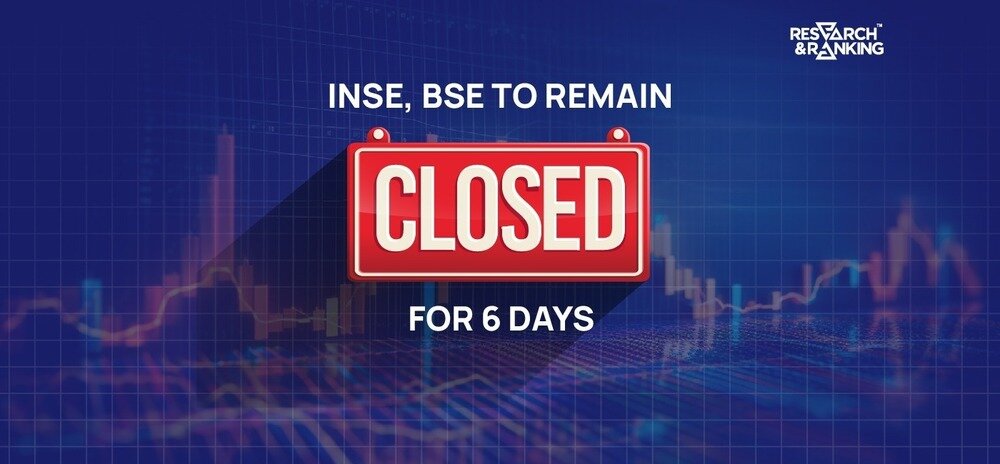As the financial year draws close, the Indian stock markets are winding down for a brief respite. The National Stock Exchange (NSE) and the Bombay Stock Exchange (BSE) are set to pause operations for six days in the last few days of March, marking many non-trading days in a single month.
The Significance of the Closure
The closure of NSE and BSE for six days is not merely a matter of routine holidays. It comes at a critical time when the financial year ends, and traders are looking to square off their positions and plan for the new fiscal year. This extended break provides a rare opportunity for market participants to reflect on the past year’s performance and strategize for the upcoming one.
The Holiday Schedule
The holiday schedule is as follows:
Weekends:
- March 23 (Saturday)
- March 24 (Sunday)
- March 30 (Saturday)
- March 31 (Sunday)
- Holi: March 25 (Monday)
- Good Friday: March 29 (Friday)
This arrangement results in a stretch of three holidays adjoining weekends, providing extended breaks for market participants. This is not the first time the Indian stock markets have seen such an extended closure. However, the convergence of holidays with weekends, particularly at the end of the financial year, is a rarity.
It’s a period that often sees heightened activity as investors and traders finalize their accounts and prepare for the tax implications of the year-end.
Impact on Commodity Trading
The Multi Commodity Exchange (MCX) will suspend the morning session on Holi but will resume trading during the evening session. On Good Friday, both morning and evening sessions will observe a halt in trading activities.
The Broader Impact
The six-day closure has broader implications for the Indian economy. It affects market liquidity, stock price volatility, and investor sentiment. The closure also coincides with significant global economic events, meaning traders must wait longer than usual to react to any international developments.
Looking Ahead
The stock market holiday list for the rest of the year includes various other significant dates, ensuring traders have ample notice for future closures. The official NSE and BSE websites have a complete list of holidays. It will not only keep you up to date but also help you build your strategy for investing in the market.
Conclusion
The six-day pause on the NSE and BSE trading calendar is noteworthy for the Indian financial markets. It offers a pause for reflection and planning amidst the hustle and bustle of the financial year-end. As traders and investors take a step back, the markets, too, take a breather and gear up for the next fiscal year with renewed vigor and strategy.
*Disclaimer Note: The securities quoted, if any, are for illustration only and are not recommendatory. This article is for education purposes only and shall not be considered as recommendation or investment advice by Research & Ranking. We will not be liable for any losses that may occur. Investment in securities market are subject to market risks. Read all the related documents carefully before investing. Registration granted by SEBI, membership of BASL, and certification from NISM in no way guarantee the performance of the intermediary or provide any assurance of returns to investors.
Know more about
IPO | Current IPO | Upcoming IPO | Listed IPO
FAQ
Why are the NSE and BSE closed for six days in March?
The NSE and BSE are closed for six days in March due to a combination of public holidays and weekends. The holidays include Holi on March 25 and Good Friday on March 29, which fall next to weekends, resulting in extended breaks for market participants.
How will the closure affect traders and investors?
The closure may affect traders and investors by limiting trading opportunities and potentially increasing market volatility before and after the holidays. Traders and investors must plan their strategies accordingly and know the holiday schedule.
Will the commodity markets also be closed on these days?
The Multi Commodity Exchange (MCX) will suspend the morning session on Holi but will resume trading during the evening session. On Good Friday, both morning and evening sessions will observe a halt in trading activities.
Are there any other significant stock market holidays in 2024?
Other significant stock market holidays in 2024 include Id-Ul-Fitr (Ramzan Id) on April 11, Ram Navami on April 17, Maharashtra Day on May 1, Bakri Id on June 17, and several others throughout the year.
What should traders do in preparation for these non-trading days?
Investors should ensure they have completed any necessary portfolio trades or adjustments before the market closes. They should also stay informed about global economic events that might affect the markets when they reopen.
Where can I find the complete list of stock market holidays for 2024?
The complete list of stock market holidays for 2024 can be found on the official websites of the NSE and BSE, as well as through financial news outlets.
How useful was this post?
Click on a star to rate it!
Average rating 0 / 5. Vote count: 0
No votes so far! Be the first to rate this post.
I’m Archana R. Chettiar, an experienced content creator with
an affinity for writing on personal finance and other financial content. I
love to write on equity investing, retirement, managing money, and more.
-
Archana Chettiarhttps://www.equentis.com/blog/author/archana/
-
Archana Chettiarhttps://www.equentis.com/blog/author/archana/
-
Archana Chettiarhttps://www.equentis.com/blog/author/archana/
-
Archana Chettiarhttps://www.equentis.com/blog/author/archana/

